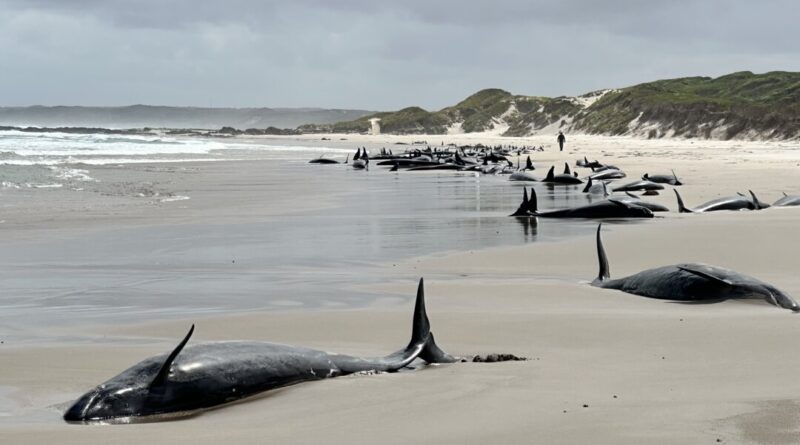Desperate Effort to Rescue 157 Whales Trapped on Secluded Shore
As per government sources 90 are still showing signs of life. Marine conservation experts, including wildlife veterinarians have reached the spot.
Rescue operations are underway after 157 false killer whales became stranded near Arthur River, Tasmania, with 90 still showing signs of life.
Marine conservation experts, including wildlife veterinarians, have arrived to assess the situation and coordinate rescue efforts.
The Department of Natural Resources and Environment Tasmania (NRE) said response efforts are being complicated by the site’s inaccessibility and rough ocean conditions.
“Stranding response in this area is complex due to the inaccessibility of the site, ocean conditions and the challenges of getting specialist equipment to the remote area,” the department told The Epoch Times.
The Marine Conservation Program (MCP) and Tasmania Parks and Wildlife Service are working together to determine the best course of action. Authorities noted that if public assistance is needed, an official request will be made.
The department also reminded the public that all whales are protected species, even after death, and it is illegal to interfere with carcasses.
Brandon Clark, Tasmania Parks and Wildlife Service’s liason officer, said initial assessments indicate that refloating would be difficult due to the beach’s inaccessibility making it difficult to transport specialised equipment.
“At this stage, we do not know why these animals have stranded, and we won’t be speculating,” he said.
“The team on the ground will be conducting post mortem investigations and sampling of deceased animals in an attempt to determine some reasoning behind the stranding.”
The department expects this operation to take a “number of days.”
False killer whales are the second largest dolphin after orcas. They are migratory and usually roam in open water.
They are believed to have already been stranded for 24 to 48 hours.
Mass strandings are common on Tasmania’s west coast, but experts believe this is the first recorded instance of false killer whales stranding in the region in 50 years.
Previous mass strandings in Tasmania include 470 pilot whales at Macquarie Harbour in 2020 and another 200 in the same harbour in 2022.
Bushfires Worsen Conditions
The whale rescue operation is currently constrained due to severe bushfires that have been burning across Tasmania for more than two weeks. Nearly 100,000 hectares of land already scorched.
The fires, which have affected the Tarkine rainforest and Cradle Mountain’s alpine ecosystems, have stretched emergency services to their limits.
The fires began with a massive lightning storm on Feb. 3, continuing a trend of increasing lightning-induced fires in Tasmania since the 1990s.
Tasmanians are also facing hazardous air quality due to the smoke, with warnings in place for the north and north-west regions.
Director of Public Health, Dr. Mark Veitch, urged residents to take precautions.
“I encourage all Tasmanians to be aware of their surroundings and know how to stay safe when it is smoky from bushfires,” Veitch said.
Authorities expect smoky conditions to persist as the fires continue to burn.





